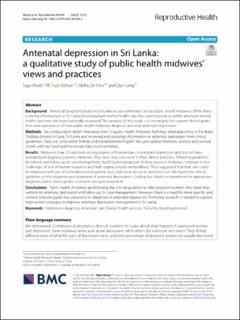| dc.contributor.author | Wyatt, Chloe Sage | |
| dc.contributor.author | Østbye, Truls | |
| dc.contributor.author | De Silva, Vijitha | |
| dc.contributor.author | Long, Qian | |
| dc.date.accessioned | 2022-06-08T07:52:24Z | |
| dc.date.available | 2022-06-08T07:52:24Z | |
| dc.date.created | 2022-05-19T14:21:59Z | |
| dc.date.issued | 2022 | |
| dc.identifier.issn | 1742-4755 | |
| dc.identifier.uri | https://hdl.handle.net/11250/2997816 | |
| dc.description.abstract | Background
Almost all pregnant people in Sri Lanka receive antenatal care by public health midwives. While there is strong infrastructure in Sri Lanka for postpartum mental health care, the current practices within antenatal mental health care have not been externally evaluated. The purpose of this study is to investigate the current clinical guidelines and experiences of how public health midwives diagnose and treat antenatal depression.
Methods
We conducted in-depth interviews with 12 public health midwives from four antenatal clinics in the Bope Poddala division in Galle, Sri Lanka and reviewed and extracted information on antenatal depression from clinical guidelines. Data was collected in Sinhala and translated into English. We used applied thematic analysis and worked closely with our local team to ensure data trustworthiness.
Results
Midwives (n = 12) reported varying degrees of knowledge on antenatal depression and did not have standardized diagnosis patterns. However, they were very consistent in their clinical practices, following guidelines for referral and follow-up of case management, building strong rapport. In their practice, midwives continue to face challenges of lack of human resources and high stigma around mental illness. They suggested that that care could be improved with use of a standardized diagnostic tool, and easier access to specialist care. We found the clinical guideline on the diagnosis and treatment of antenatal depression is lacking key details on symptoms for appropriate diagnosis, but it clearly guides on how to navigate treatment.
Conclusions
Public health midwives are following the clinical guideline to refer pregnant women who need intervention for antenatal depression and follow-up for case management. However, there is a need for more specific and context-relevant guidelines, especially for diagnosis of antenatal depression. Formative research is needed to explore intervention strategies to improve antenatal depression management in Sri Lanka. | en_US |
| dc.language.iso | eng | en_US |
| dc.publisher | BioMed Central | en_US |
| dc.rights | Navngivelse 4.0 Internasjonal | * |
| dc.rights.uri | http://creativecommons.org/licenses/by/4.0/deed.no | * |
| dc.title | Antenatal depression in Sri Lanka: a qualitative study of public health midwives’ views and practices | en_US |
| dc.type | Journal article | en_US |
| dc.type | Peer reviewed | en_US |
| dc.description.version | publishedVersion | en_US |
| dc.rights.holder | Copyright 2022 The Author(s) | en_US |
| dc.source.articlenumber | 23 | en_US |
| cristin.ispublished | true | |
| cristin.fulltext | original | |
| cristin.qualitycode | 1 | |
| dc.identifier.doi | 10.1186/s12978-022-01330-z | |
| dc.identifier.cristin | 2025706 | |
| dc.source.journal | Reproductive Health | en_US |
| dc.identifier.citation | Reproductive Health. 2022, 19, 23. | en_US |
| dc.source.volume | 19 | en_US |
| dc.source.issue | 1 | en_US |

